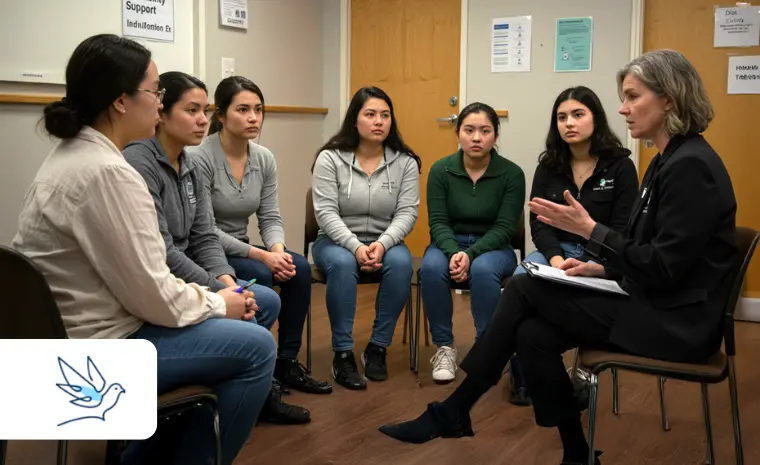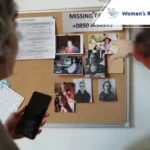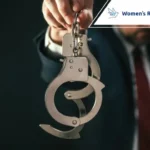Summary
While trafficking in women and girls is widely recognized, men, boys, and LGBTQ+ individuals are also exploited in sex trafficking, forced labor, and other forms of abuse. This blog explores stereotypes, legal protections under federal law, and how communities can support all trafficked people, with resources for victims in California.
Table of Contents
Trafficking in women and girls dominates headlines and public awareness, often framed as the defining image of human trafficking. While it is true that women and girls make up a large portion of victims, they are not the only ones.

Men, boys, and LGBTQ+ individuals are also exploited through sex trafficking, forced labor, and sexual exploitation. By limiting the narrative, we risk leaving countless survivors unseen and unsupported.
This article explores the broader reality of trafficking, the legal implications in the United States, and how California communities can work toward inclusive solutions.
Why the Focus on Trafficking in Women and Girls?
According to the U.S. Department of State, women and girls are disproportionately affected by human sex trafficking and commercial sexual exploitation.
Cases in Los Angeles and across the country often show patterns where women and minors are targeted due to gender-based vulnerabilities. This focus has highlighted urgent issues, but it can hide other victims’ experiences.
Common stereotypes include:
- Women as the “typical” trafficking victim
- Men are viewed as perpetrators rather than potential victims
- LGBTQ+ individuals are rarely included in official statistics
These stereotypes can harm victims by denying them recognition, access to services, or justice.
Male and LGBTQ+ Victims in Human Trafficking
The trafficking of minors does not exclusively affect girls. Boys and young men may also be coerced into the commercial sex industry. LGBTQ+ individuals, particularly homeless youth, are especially vulnerable to sexual abuse and commercial sexual exploitation.
Forms of exploitation include:
- Forced labor in industries like agriculture, construction, and restaurants
- Sexual exploitation of men and boys in sex trafficking cases
- Exploitation of LGBTQ+ youth in the commercial sex industry
The 2022 Global Report on Trafficking in Persons indicates that males now account for about 40% of victims worldwide. Despite this reality, these survivors often remain invisible due to stigma, underreporting, and a lack of inclusive outreach programs.
Why Men Rarely Report or Are Recognized as Victims
Men and LGBTQ+ victims face unique barriers:
- Social stigma: Admitting victimization conflicts with cultural ideas of masculinity.
- Lack of awareness: Law enforcement and even service providers may overlook male victims.
- Fear of deportation: Many trafficked people fear reporting due to their immigration status.
- Limited services: Many shelters and recovery programs focus on women and girls.
This gap results in underreporting, leaving victims without Legal Representation or access to resources.
The Importance of Inclusive Support Services
Every survivor deserves care, whether they suffered physical injuries, sexual abuse, or financial losses. Inclusive services can ensure that survivors are not re-traumatized or excluded.
Key needs include:
- Medical expenses support for the treatment of injuries and trauma
- Legal process guidance, including filing a civil case under federal law
- Safe housing that welcomes men, women, and LGBTQ+ victims
- Community education that dismantles stereotypes and emphasizes inclusivity
How Communities Can Help Survivors
Communities in California play a critical role in fighting trafficking and supporting survivors.
Steps to take:
- Know the signs: Recognize indicators like restricted movement, fear of speaking, or working under coercion.
- Report suspicions: Contact the National Human Trafficking Hotline at 1-888-373-7888.
- Support survivors locally: Advocate for shelters, legal aid, and job programs that serve all victims.
- Engage schools and colleges: Educational institutions can partner with community organizations to raise awareness.
- Partner with professionals: Work with healthcare providers and social workers to identify and support trafficked people.
Legal Context: Protections and Challenges
In the United States, trafficking crimes are prosecuted under both federal law and state laws, including California statutes. Survivors may file a civil case to recover damages for medical expenses, lost wages, and emotional trauma.
Key legal protections and options available to survivors include:
- Los Angeles and California law enforcement agencies work with federal partners to prosecute traffickers.
- Survivors often require strong legal representation to navigate complex sex trafficking cases and claim compensation.
- A California human trafficking lawyer can guide survivors through the legal process and fight for their rights.
Victims may also seek restitution in cases involving commercial sexual exploitation or forced labor, where traffickers profited from abuse.
Recognizing Every Victim, Protecting Every Voice
Trafficking in women and girls is a critical issue, but it is not the whole story. Men, boys, and LGBTQ+ individuals are also victims of human sex trafficking and deserve equal recognition, protection, and justice. Communities, institutions, and legal professionals must expand their approach to ensure no survivor is left behind.
📞 If you or someone you know has been affected, reach out to a California human trafficking lawyer for a free consultation. Protect your rights, seek justice, and begin the path toward recovery today.
FAQs
What is the most common form of human trafficking in the United States?
Sex trafficking is the most reported form, though forced labor also affects many trafficked people.
Are men victims of human sex trafficking?
Yes. Men and boys are also exploited, especially in labor trafficking and commercial sexual exploitation.
What resources are available for survivors in California?
Survivors can contact the National Human Trafficking Hotline and seek Legal Representation from California human trafficking lawyers.
Can survivors file a lawsuit for damages?
Yes. Under federal law, victims may pursue a civil case to recover medical expenses and compensation for trauma.
How can I help stop trafficking in my community?
Learn the signs, support advocacy groups, and report suspicions to law enforcement or the National Human Trafficking Hotline.






